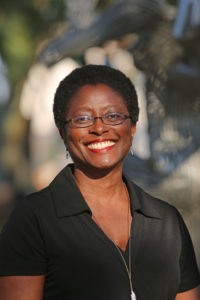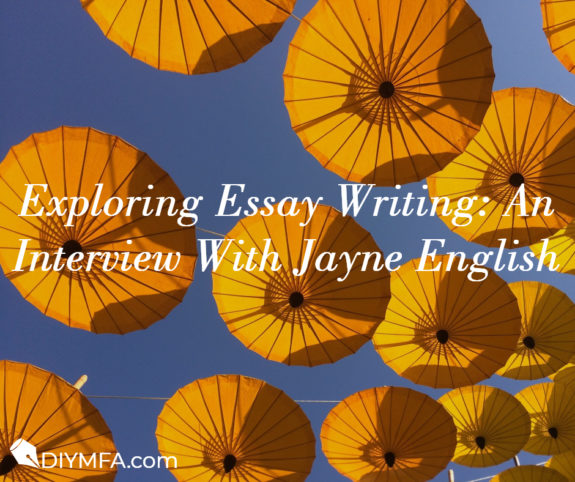I love to read essays. In my job as reference librarian, I sneak titles of single author essay collections or essay anthologies into as many reader’s advisory (RA) recommendations as I can. However, most readers choose the fiction I offer over the essays. Nobody ever seems to willingly admit they read essays. Doesn’t inspire us writers to take up writing essays, does it? Of course, my RA experiences don’t tell the whole story.
Marilynne Robinson. Toure. Sarah Vowell. Chimamanda Ngozi Adichie. Rebecca Solnit. Roxane Gay. These writers’ success — all expert essayists — reflect the truest picture of essays’ larger popularity.
Despite my reading preferences, I’m a little intimidated about writing the particular form. In search of essay writing encouragement, I asked Jayne English, a friend and columnist at Relief: A Journal of Art & Faith, to demystify the process of writing essays.
Jayne, we’ve been friends for decades. We’ve also been poetry and prose critique partners off and on. I know you write articles, poetry, and currently, essays for Relief. Your Relief bio mentions some of your diverse publications.
How did you get started writing essays? Did your essay writing begin with Relief? How long have you written essays?
I was in a poetry workshop led by Bruce Kirby, who was the blog editor for Relief at the time. He suggested I submit a few essays to Relief for consideration. They published my first essay in 2014. I had been concentrating on poetry, so the prospect of writing even a 500-word essay every month sounded a little daunting, but I’m glad I accepted the challenge!
Your essays are meditative, layered, and eclectic. You weave threads of culture, news, art, and faith into a cohesive piece of writing. All the things, I feel, that make for great essays and great poetry. Do you think your poetry writing helps you in writing essays?
Writing poetry definitely benefits writing essays. Poetry helps you slow down and think about the movement and sound of words. It helps you think carefully about the meanings of the words you choose. I really like how the Old French and Late Latin blend the origins of “essay” to give the sense of “weighing,” which is how I would describe my essays. Writing, reading, and discussing poetry has really helped train my mind to weigh, to carefully consider, the ideas and concepts I’m writing about.
Do you write essays outside of your Relief column? Why do you think essays are important?
I try to write one essay or even a short story per month outside of writing for Relief. Writing for other journals, in other genres, challenges me to move out of my depth to hopefully become a stronger, more imaginative writer.
I used to write non-fiction articles which provided answers to questions about a particular topic. What I think is important about essays is that their scope goes beyond answering questions to raising them. It’s like Edward Hopper’s painting Cape Cod Morning. The subject stands at her window, sunlight slants into the room and across trees and grasses. She has probably seen this view a thousand times before. But this time she leans forward, looking intently out the window. Something unexpected has caught her attention. Essays are important because they captivate our thoughts making us lean forward to see something that may have been outside our window all along, but is now cast in a different light.
It’s this posture – this leaning in to curiosity, discovery, wonder – that I hope my essays elicit in the mind of the reader.
I hate to ask this but which form is your favorite — poetry or essay? Why or why not?
Writing essays seems to suit my thought processes at the moment, and I find it easier to weave themes together in a conversational format. My hope is that my essays are poetic – in sound, movement, metaphor, and in how they can transport a reader to an unexpected place and help them pull away from their world; what Coleridge called “the film of familiarity.”
You and I talk about writing and productivity often. We writers are quite harsh in judging our creative output. We both struggle with “writing slow” but I think I have a slightly different take on what makes a slow writer. I write a 700-word local library column which takes a week of thinking/planning/research and 2-3 days to write. A typical 800+-word DIY MFA article takes weeks of thinking/planning/research and about 5 days to write.
What’s your definition of writing slow?
For me, writing slow includes reading and writing together. As you mentioned, my writing usually weaves together something from different disciplines like art, music, literature. So while I’m writing about this idea that has captivated me I’m thinking, what is this like? As in poetry I begin to look for metaphors to help shed light on the concept.
Metaphors in my essays have included gyroscopes to represent life’s frantic nature, reaching for beads of mercury as a way of looking at longing, and thinking about the Venus de Milo as a metaphor for beauty in brokenness.
I try to remind myself that writing speed doesn’t correlate with writing quality. If we writers focus on craft, quality will follow. With that in mind, do you have an essay you’re particularly proud of?
“Peeling Back the Layers” comes to mind, it’s about Bill Murray’s movie St. Vincent. It should have been just a sentimental movie, and while there were some elements of that, I was really pleased to see the movie venture into deeper themes. I loved watching the characters change as their lives intersected, or usually, collided.
In my reading for the essay, I came across a beautiful poem [“here rests”] by Lucille Clifton that really shed light on the change that was going on inside the characters. It’s not really just about the characters, though. It’s about what goes on in us as we watch them. The movie and the poetry are great examples of how art can help us develop as individuals as we come under its influence and live briefly in its story.
 Jayne English is a blogger, essayist and poet. Her work has appeared in American Libraries, Saint Katherine Review, and Woman’s Touch among other magazines. She is smitten with poetry and often turns to poets to translate the language of life into “motes/of gold moving/from shadow to shadow.” An archive of Jayne English’s essays can be found at Relief.
Jayne English is a blogger, essayist and poet. Her work has appeared in American Libraries, Saint Katherine Review, and Woman’s Touch among other magazines. She is smitten with poetry and often turns to poets to translate the language of life into “motes/of gold moving/from shadow to shadow.” An archive of Jayne English’s essays can be found at Relief.
 Brenda Joyce Patterson is a poet, writer, librarian, and lover of short writing forms. Her poetry and flash fiction have been published in Vayavya, Gravel Magazine, and Melancholy Hyperbole. Along with works by Maya Angelou, Gwendolyn Brooks, and Alice Walker, her travel essay “The Kindness of Strangers” appeared in Go Girl: The Black Woman’s Guide to Travel and Adventure.
Brenda Joyce Patterson is a poet, writer, librarian, and lover of short writing forms. Her poetry and flash fiction have been published in Vayavya, Gravel Magazine, and Melancholy Hyperbole. Along with works by Maya Angelou, Gwendolyn Brooks, and Alice Walker, her travel essay “The Kindness of Strangers” appeared in Go Girl: The Black Woman’s Guide to Travel and Adventure.







